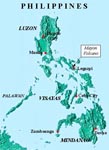Governor battles to improve life in strife-torn Mindanao
 Manila - A mere mention of its name conjures images of unbridled violence, gnawing poverty and wanton neglect that Governor Datu Zaldy Ampatuan said he hopes to erase in the near future.
Manila - A mere mention of its name conjures images of unbridled violence, gnawing poverty and wanton neglect that Governor Datu Zaldy Ampatuan said he hopes to erase in the near future.
Ampatuan heads the five-province Autonomous Region in Muslim Mindanao in the strife-torn southern Philippines, home to the country's Muslim minority.
"We are determined to break the cycle of violence and poverty in our land," he told reporters during a rare visit to Manila.
The region covers the provinces of Tawi-Tawi, Maguindanao, Lanao del Sur, Basilan and Sulu as well as the Islamic city of Marawi - which are all among the poorest areas of the Philippines.
According to the latest statistics, compiled from 2004 to 2005 by the National Statistical Coordination Board, the poverty rate in Tawi-Tawi was 78.9 per cent - the highest in the Philippines.
In Maguindanao, 62 per cent of the population lived below the poverty line, set at income of less than 6,200 pesos (151 US dollars) a month. Lanao del Sur's rate was 52.5 per cent, Sulu's 45.1 per cent and Basilan's 31.7 per cent - all above the national average of 27 per cent.
"It is a reality that cannot be glossed over, and we are addressing it," Ampatuan said. "We have tapped even foreign donors to help us in our anti-poverty programmes."
He said the United States was scheduled to bring the US Mercy Mission hospital ship to Maguindanao in May for one month to provide medical treatment to thousands of poor people.
"Aside from treating our people, the US medical mission will also train paramedics in order to further boost the delivery of health services in the region," he said.
The boyish first-time governor said his administration has been relentless in supporting agricultural, fishery, entrepreneurial and other projects to improve the livelihoods of the region's people as well as pursuing health programmes and other poverty-alleviation measures.
Ampatuan pointed out that the latest government poverty data was collated prior to his assumption of office in 2005.
"I believe that in the next poverty survey, our region will do better," he said. "Our land is very fertile and rich in natural and mineral resources. All we have to do is develop it."
But efforts to improve the social and economic standing of residents of the region have been hobbled by decades of strife and wanton violence.
The region has seen more than three decades of Muslim insurgency and is a stronghold of al-Qaeda-linked Muslim Abu Sayyaf rebels and Jemaah Islamiyah militants.
Aside from the rebels, the presence of various armed groups and rampant clan wars have become major peace and order problems.
The Ampatuan family has not been spared from the violence. A brother died in a bombing in 2002 and his father, former regional governor Andal Ampatuan, has survived at least three assassination attempts over the past six years.
"Private armed groups will not disappear because bearing arms is part of the culture of Muslims," Governor Ampatuan said. "From the time a child is born, he already gets a weapon."
Ampatuan said his administration was promoting dialogue as a way to peacefully settle personal feuds, which often deteriorate into armed confrontations that might kill dozens of people and displace thousands.
"We are gaining headway in making people here realize that it's better to settle their disputes through peaceful means rather than through guns," he said.
"During the past three years, we have resolved 18 big clan disputes, and a committee is mediating in more than 100 more," he added.
Ampatuan expressed confidence that violence in the region would significantly decrease once its people realized that the mechanism for settlement of personal disputes is working.
He also expressed hope that peace talks between the separatist Moro Islamic Liberation Front and the Philippine government would move forward and result in an agreement that would boost development in the Muslim homeland.
"We need a lot of creativity and a lot of hope to surmount the myriad of challenges we are facing," he said. "We cannot wallow in despair." (dpa)